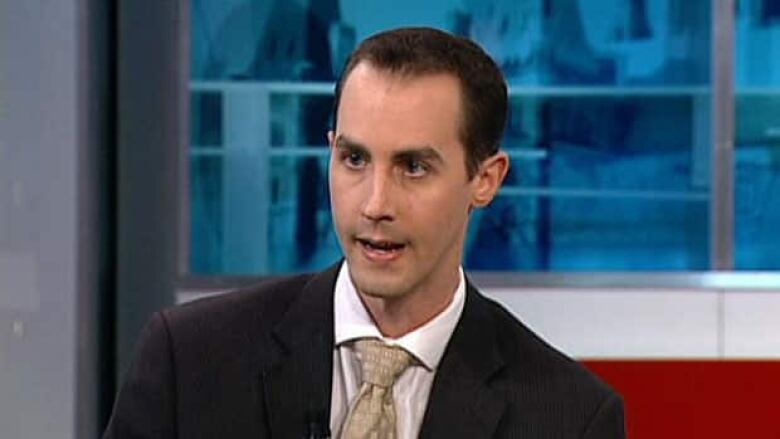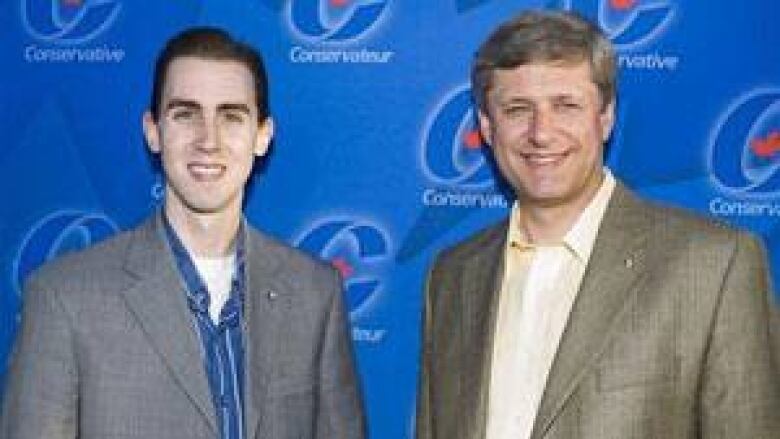Robocalls revealed by Michael Sona, investigator alleges
Elections Canada witnesses allege Sona talked about plan for misleading election day calls

Michael Sona told "several" people about misleading phone calls that sent voters in 2011 to the wrong polling station, an Elections Canada investigator alleges in court records.
In the affidavit, Elections Canada investigator Al Mathews alleges severalpeople came forward in March 2012 to say that Sona talked to them about arranging a fraudulent automated robocall that directed more than 7,000 voters in Guelph, Ont., to the wrong polling station.
The information is contained in a document known as an "information to obtain a production order," a sworn affidavit filed in an Ottawa court by Mathews asking a judge to order the production of otherevidence or documents, as part of his investigation into misleading robocalls made during the 2011 federal election.
Sona, 24, who now lives in Ottawa, is the only person charged in the case. He worked for Guelph Conservative candidate Marty Burke in the lead-up to the May 2, 2011 election, and went on to work for Conservative MP Eve Adams. Sona is charged with wilfully preventing or endeavouring to prevent a voter from casting a ballot.
Sona has repeatedly denied having anything to do with the calls and says he didn't have access to the phone list necessary to arrange for the calls.
Norm Boxall, Sona's lawyer, declined to comment on the allegations contained in the court documents.
"My view remains that my client should provide his response in court and that it is not appropriate to try this case in the media in advance of the trial," he said in an email to CBC News.
Muchof the information in the affidavit was released to the public in late August, but parts were subject to a court-ordered publication ban, which CBC News and other media outlets challenged. A judge on Monday agreed to allow publication of some of that material, but the names of witnesses and some of the information in their statements remain under a publication ban.
None of the details in the affidavit have been proven in court.
Themisleading automated calls went out to voters listed by the Conservative Party as non-supporters on the day of the federal election. The call claimed to be from Elections Canada and wrongly announced to votersthat their polling station had moved. It's illegal under the Canada Elections Act to try to interfere with someone's right to vote.
Party lawyer went with witnesses
Mathews says in his affidavit that witnesses came forward to describe conversations they had with Sona shortly after the May 2, 2011 federal election.
"Michael Sona, in the period shortly after Election Day, advised several of his acquaintances of participation in the false calls made to Guelph electors," Mathews wrote.

Mathews alleges the witnesses, all accompanied by Conservative Party lawyer Arthur Hamilton, told him that Sona said he had been involved in the misleadingrobocalls.
One pair of witnesses, Mathews alleges in the affidavit, described separately a conversation with Sona while they were working in an MP's office about a week to 10 days after voting day.
"The visit was a social one, allowing party workers the chance to catch up with each other. It was not unusual for workers to socialize in this manner," Mathews wrote in the affidavit.
"Both witnesses knew Michael Sona and both described him as someone given to exaggeration, and telling 'outlandish...tall tales.'"
"Both witnesses told me that they were not sure whether to believe Sona's account or not," Mathews wrote.
Other witnesses told Mathews they were also uncertain whether to believe Sona, Mathews alleges in the affidavit.
"Both witnesses knew Michael Sona and both described him as someone given to exaggeration," he wrote.
According to the affidavit, Mathews conducted the interviews in March and April, 2012.
Mathews refers in the affidavit to the possibility two people could have been involved in setting up the misleading calls.
"I have noted that I suspected that others were involved as well as Sona, but in each case I have been clear that I was asking Sona to provide a statement to me under warning," Mathews said in the affidavit, referring to a cautioned statement. A cautioned statement means a person answering questions is aware his statement can be used against him in court.












_(720p).jpg)


 OFFICIAL HD MUSIC VIDEO.jpg)
.jpg)



























































































